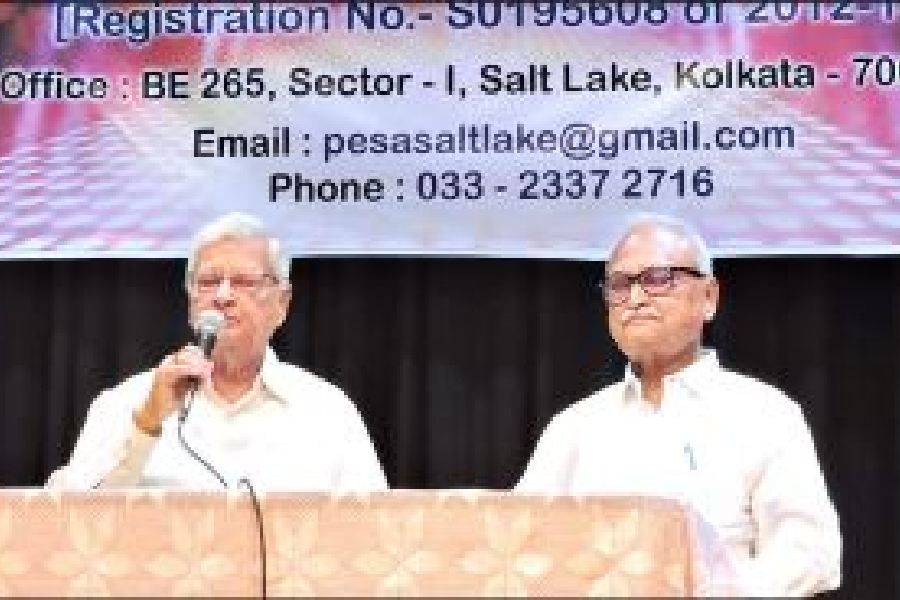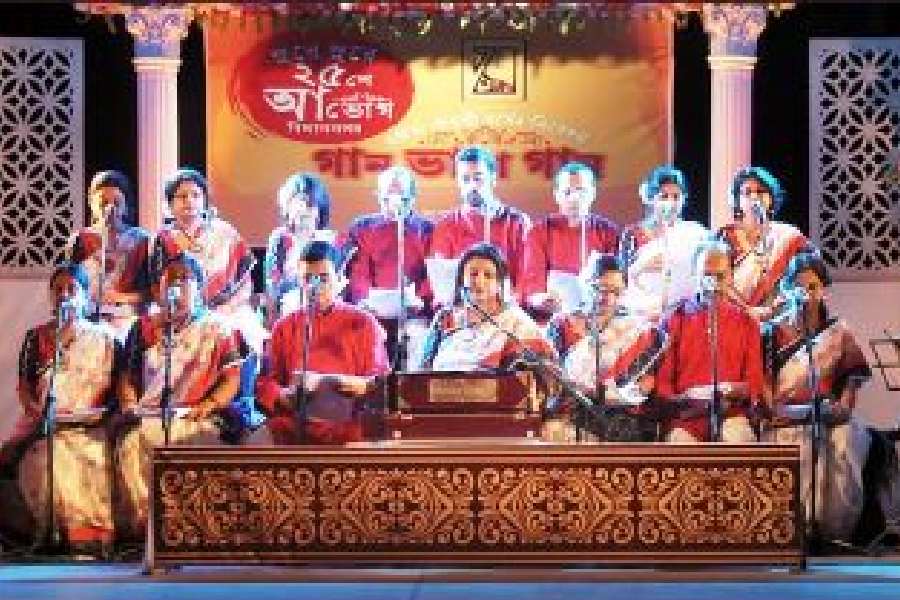TO MARK 25 years of their musical journey, AC Block-based cultural group Abhog hosted a show exploring Tagore’s transcreations.
The Laban Hrad Mancha event was titled Gaan Bhanga Gaan, and had members performing both originals and Tagore’s versions of the songs. The event unfolded with a chorus of Tagore’s Brahmo upasana sangeet Kaar milano chao birohi. This song was inspired by the Hindustani classical Tanu milana de parbar, and was sung on the day by Lopamudra De and Jayati Sanyal.
Goutam Kar performed Tagore’s Maharajo eki saaje, followed by another Hindustani classical song it was inspired by, Mere dund dalo saaje, that was sung in duet.
Debjani Sarkar introduced the audience to a Carnatic song Nidu charano mule, that a South Indian student at Santiniketan, Savitri Govindan, had sung to Tagore. The bard loved it so much he composed Baje karuno sure, based on it.
Barnali Deogharia sang a Parsi tarana Dara dim dara dim, followed by Tagore's Sukhhin nishidin, that was also composed in tarana style. Anindya Pal sang Bhenge mor gharer chabi that had a folk background, and Soibal Sen sang Kaan pete roi, the original of which, Lalon's Katha koi re dekha dei na, was sung by Parama Chatterjee.
In the Western section, English poet Ben Jonson's Drink to me was sung by Sanghita Chatterjee, followed by Tagore's adaptation of the same — Katobaro bhebechhinu — by Chandana Samanto. A chorus presented the Irish ballad Nancy Lee and then its adaptation Kali, Kali bolo re aaj. And of course there had to be the Scottish folk number Auld lang syne and its Bengali cousin Purano sei diner kotha.
“Abhog isn’t a music school but a centre to discuss, practise and present the works of Tagore and other poets of Bengal,” said Swasati Adhikary, secretary of the group and wife of their figurehead Kanchan Baran Adhikary, who passed away during the pandemic.
“The concept of Gaan bhanga gaan was conceived
by our guru and mentor Kanchanda and we had performed it a few times too. But
this was the first time we did so in his absence,” said Sarkar, who directed
the show.
Alumni showcase

Justice (retd) Ganendra Narayan addresses the audience, with Pesa president Achyut Ghosh seated next to him
AFTER A span of three years, Presidency Ex-Students Association (PESA) was back on stage with an array of cultural events.
The Rabindra Okakura Bhavan show began with a shanti mantra by Monalisa Chandra, after which Sitangshu Sekhar Ganguly, in his 80s, sang solo. He presented Tagore’s Alpo loiya thaki and the devotional song Amar katodin hobe premosanchar, which Swami Vivekananda had sung for Sri Ramakrishna. "These songs are my favourites,” said the 1951 passout.
PESA president Achyut Ghosh emphasised on the involvement of the young members in the association. Justice (retd) Ganendra Narayan Roy, chief patron and former president of the group, elaborated on the history of the association. “The world is passing through a distressing phase so let’s pray for peace and the enrichment of Bengali heritage and culture," he said.
Ghosh’s granddaughter Dibyabha Ghosh sang two songs, Sachindra Nath Saha read the short story Bidhata by Banaphul and Mahua Chatterjee sang Je raate mor duarguli.
Outgoing president Manasi Roy performed Rabindrsangeet, folk and a parody of Nirjharer Swapnobhango in the light of the mosquito menace — Jor jor er Swapnobhango — that made the audience burst into laughter."
Recalling her college days Roy, a retired space scientist, said: “I am proud to belong to the first batch student of students under the distinguished physics professor Amal Kumar Raychaudhuri. I also studied under Rajendralal Sengupta, who used to lead such a simple life. His clothes would be crushed and hair uncombed," said Roy.
Baishakhi Sarkar, commemorating Satyajit Ray, presented glimpses of Ray's life, work and achievement, Ballary Roy presented Aloker ei jharnadharay and guest singer Sunanda Mukhopadhyay performed Rabindrasangeet, Dwijendrageeti and tappa. Nandini Dutta, who was brought up in South Africa, performed the famous Swahili song Malaika nakupenda malaika. “The song means, My Angel, I love you,” she explained. “In fact, the lyrics also include the word pesa, and pesa here means money.”
“We were deprived of cultural programmes for almost three years due to the pandemic and so were all excited for today. Most importantly, many elderly members performed," said executive committee member, PESA, Susmita Ghosh.
